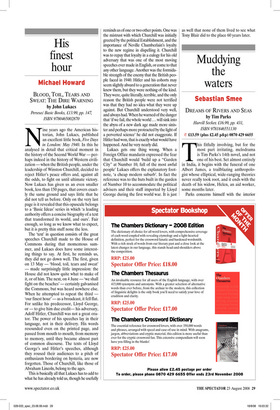His finest hour
Michael Howard
BLOOD, TOIL, TEARS AND SWEAT: THE DIRE WARNING by John Lukacs Perseus/ Basic Books, £13.99, pp. 147, ISBN 9780465002870 Nine years ago the American historian, John Lukacs, published an excellent little book, Five Days in London: May 1940. In this he analysed in detail that critical moment in the history of the Second World War — perhaps indeed in the history of Western civilization — when the British people, under the leadership of Winston Churchill, decided to reject Hitler’s peace offers and, against all the odds, to fight on until ultimate victory. Now Lukacs has given us an even smaller book, less than 150 pages, that covers exactly the same ground and says little that he did not tell us before. Only on the very last page is it revealed that this opuscule belongs to a ‘Basic Ideas’ series in which ‘a leading authority offers a concise biography of a text that transformed its world, and ours’. Fair enough, so long as we know what to expect, but it is pretty thin stuff none the less.
The ‘text’ in question consists of the great speeches Churchill made to the House of Commons during that momentous summer, and Lukacs does have some interesting things to say. At first, he reminds us, they did not go down well. The first, given on 13 May — ‘blood, toil, tears and sweat’ — made surprisingly little impression: the House did not know quite what to make of it, or of him. The next, on 4 June — ‘we shall fight on the beaches’ — certainly galvanised the Commons, but was heard nowhere else. When he attempted to repeat the third — ‘our finest hour’ — as a broadcast, it fell flat. For unlike his predecessor, Lloyd George, or — to give him due credit— his adversary, Adolf Hitler, Churchill was not a great orator. The power of his speeches lay in their language, not in their delivery. His words resounded even on the printed page, and passed from mouth to mouth, from memory to memory, until they became almost part of common discourse. The texts of Lloyd George’s and Hitler’s speeches, although they roused their audiences to a pitch of enthusiasm bordering on hysteria, are now forgotten. Those of Churchill, like those of Abraham Lincoln, belong to the ages.
This is basically all that Lukacs has to add to what he has already told us, though he usefully reminds us of one or two other points. One was the mistrust with which Churchill was initially greeted by the political Establishment, and the importance of Neville Chamberlain’s loyalty to the new regime in dispelling it. Churchill was to repay that loyalty in a eulogy for his old adversary that was one of the most moving speeches ever made in English, or come to that any other language. Another was the formidable strength of the enemy that the British people faced in 1940. Hitler and his cohorts may seem slightly absurd to a generation that never knew them, but they were nothing of the kind. They were, quite literally, terrible, and the only reason the British people were not terrified was that they had no idea what they were up against. But Churchill understood very well, and always had. When he warned of the danger that ‘if we fail, the whole world . . . will sink into the abyss of a new dark age made more sinister and perhaps more protracted by the light of a perverted science’ he did not exaggerate. If Hitler had won, that is exactly what would have happened. And he very nearly did.
Lukacs gets one thing wrong. When a Foreign Office mandarin expressed the fear that Churchill would ‘build up a “Garden City” at Number 10, full of the most awful people’ Lukacs offers the explanatory footnote, ‘a cheap modern suburb’. In fact the reference was to the huts built in the garden of Number 10 to accommodate the political advisers and their staff imported by Lloyd George during the first world war. It is just as well that none of them lived to see what Tony Blair did to the place 60 years later.


























































 Previous page
Previous page